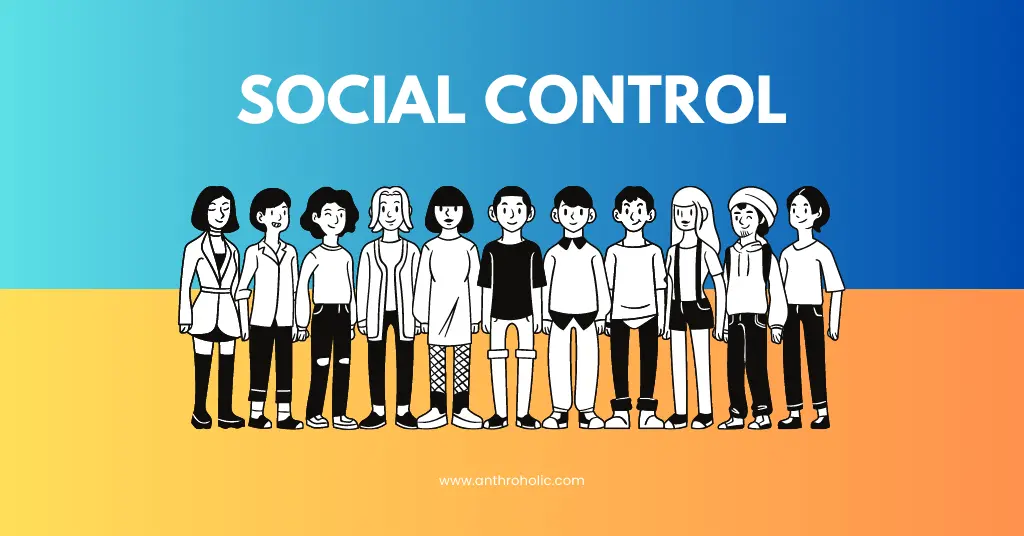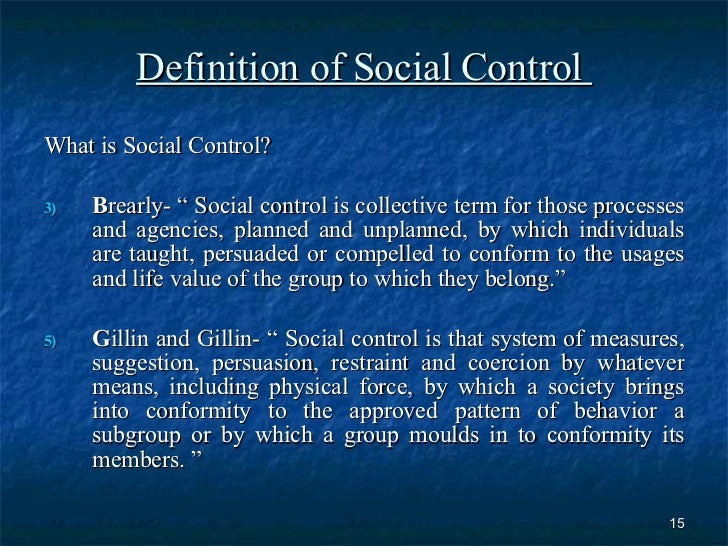Imagine a world without rules, where individuals act solely on their own desires. Would it be a utopia of freedom or descend into chaos? Throughout history, societies have grappled with this dilemma, crafting intricate systems of social control to maintain order and regulate behavior. From the ancient codes of Hammurabi to the modern algorithms of social media, these systems shape our lives in ways we often don’t fully comprehend. This exploration delves into the fascinating world of social control, uncovering its intricate mechanisms and its profound impact on our daily lives.

Image: anthroholic.com
Understanding social control is crucial for navigating our complex world. It helps us analyze the forces that shape societal norms, appreciate the delicate balance between individual liberty and collective well-being, and become informed citizens capable of contributing to a just and equitable society. This journey into the realm of social control will shed light on how these often-invisible forces work, prompting critical reflection and encouraging constructive dialogue about their role in shaping our present and future.
Defining the Invisible Hand: What is Social Control?
The term “social control” encompasses the diverse mechanisms that societies employ to ensure conformity to societal norms and values. It’s a broad umbrella that includes formal and informal methods, often operating subtly and influencing our choices without explicitly stating commands. This intricate dance between individual action and societal pressure is an omnipresent force in our lives, shaping everything from how we dress to our political beliefs.
Formal Social Control: The Concrete Framework
Formal social control utilizes explicit rules, laws, and institutions to maintain order. Think of the legal framework that governs our actions, including traffic laws, criminal codes, and the judicial system. These mechanisms are backed by the authority of the state and are enforced through sanctions, ranging from fines and imprisonment to social ostracization. Formal systems aim to provide a framework for predictable behavior, preventing chaos and protecting individual rights.
Examples of Formal Social Control:
- Laws and Regulations: Federal and state laws, local ordinances, and international agreements define the boundaries of acceptable behavior.
- Law Enforcement: Police, judges, and courts play a vital role in enforcing laws and administering justice.
- Education Systems: Schools instill societal values, impart knowledge, and prepare individuals for responsible participation in society.
- Religious Institutions: Religious doctrines and practices provide moral guidance and social cohesion.

Image: triumphias.com
Informal Social Control: The Subtle Whispers
Informal social control relies on social pressure, gossip, and the unspoken rules that govern everyday interaction. It operates through social cues, expectations, and norms that we learn through socialization. These subtle forces influence our choices and behaviors, often without us consciously acknowledging them. Informal social control can be incredibly powerful, shaping our perceptions and shaping our actions in complex and oftentimes unconscious ways.
Examples of Informal Social Control:
- Social Norms: These unwritten rules govern everything from table manners to appropriate dress at a job interview.
- Peer Pressure: The influence of friends and social groups shapes our choices and behaviors, often encouraging conformity.
- Social Status: Our position in society and our relationships with others influence our behavior and interactions.
- Public Opinion: The collective sentiment of a community or society exerts pressure on individuals to conform.
A History of Social Control: Evolution and Transformation
Throughout human history, systems of social control have adapted and evolved with changing societal structures, technological advancements, and evolving ideologies.
Ancient Beginnings: From Hammurabi to the Roman Empire
Ancient civilizations relied heavily on codified laws and religious doctrines to regulate behavior. The Code of Hammurabi, a collection of Babylonian laws dating back to 1750 BC, clearly defined punishments for various offenses. Similarly, the Roman Empire established a complex legal system, utilizing a hierarchy of courts and laws to maintain order within its vast territory.
Medieval Times: From Feudalism to the Church
During the medieval period, social control was intertwined with feudalism and religious authority. The Church played a dominant role in shaping moral standards and enforcing social norms. The threat of excommunication or divine judgment served as a powerful deterrent against transgressions. The social hierarchy of feudalism also contributed to social control, with obligations and responsibilities clearly defined based on one’s position in society.
The Enlightenment and Modern Society: Shifting Paradigms
The Enlightenment era ushered in a new era of thinking, emphasizing individual rationality and human rights. This shift challenged traditional systems of social control and paved the way for modern democratic societies. However, the rise of industrialization and urbanization brought new challenges, prompting the development of new mechanisms of social control, such as policing and centralized bureaucracy.
The Digital Age and the Rise of Technocratic Social Control
The advent of the internet and social media has ushered in a new era of social control, marked by the pervasive influence of technology and algorithmic systems. Online platforms collect vast amounts of data, enabling them to predict and influence user behavior in subtle ways. Social media algorithms prioritize content based on our past interactions, often creating echo chambers and reinforcing pre-existing biases. This raises concerns about the potential for manipulation and the erosion of individual autonomy in a digitally connected world.
Algorithmic Bias and the Power of Data
Algorithmic systems are built on data, and data is inevitably influenced by existing social biases. This can lead to systemic discrimination and perpetuate inequalities. For example, algorithms used in hiring processes may inadvertently favor candidates from certain demographics based on unconscious biases in the data they are trained on. Understanding these biases is crucial for ensuring fairness and transparency in the design and implementation of algorithms.
Surveillance and Privacy Concerns
The increasing prevalence of surveillance technology, both in public and private spheres, raises serious concerns about privacy and civil liberties. Facial recognition software, GPS tracking, and data-mining algorithms used by governments and corporations create a constant sense of scrutiny, blurring the lines between individual autonomy and social control. These technologies have the potential to be used for both positive and negative purposes, and careful ethical considerations are required to ensure their responsible use.
The Future of Social Control: Balancing Freedom and Order
As technology continues to evolve, so too will systems of social control. The challenge lies in finding a balance between individual freedom and collective well-being, ensuring that social control mechanisms promote a just and equitable society while respecting the fundamental rights of each individual.
Ethical Considerations and Responsible Innovation
The development and deployment of new technologies must be guided by ethical principles, prioritizing transparency, accountability, and human rights. We need to ensure that algorithms are designed and used in a way that benefits society as a whole, while safeguarding against potential harm. Engaging in open dialogue about the ethical implications of emerging technologies is critical for promoting responsible innovation.
Citizen Empowerment and Active Participation
Social control is not simply a passive process imposed by external forces. Individuals play an active role in shaping the social landscape through their actions and choices. Empowering citizens with knowledge, critical thinking skills, and the ability to participate in democratic processes is crucial for ensuring that social control mechanisms reflect the values and aspirations of a diverse society.
System Of Social Control
https://youtube.com/watch?v=U78nn3YhiHo
Looking Ahead: A Shared Responsibility
The future of social control depends on our collective efforts. By understanding the intricacies of these systems, engaging in open dialogue, and promoting responsible innovation, we can navigate the challenges of a complex world and create a society that upholds both individual freedom and collective well-being. The journey continues, and it is through our shared responsibility and collective action that we can shape a future where social control serves as a force for good, promoting harmony and progress for all.

:max_bytes(150000):strip_icc()/OrangeGloEverydayHardwoodFloorCleaner22oz-5a95a4dd04d1cf0037cbd59c.jpeg?w=740&resize=740,414&ssl=1)




